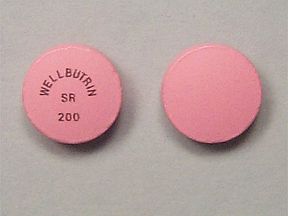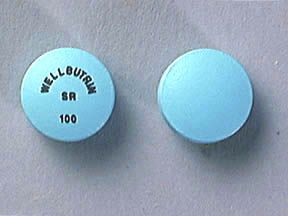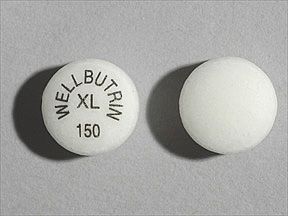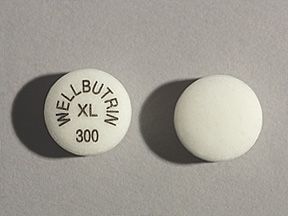Wellbutrin (bupropion hydrochloride) is a brand-name drug that’s prescribed for certain types of depression. This medication comes in sustained-release or extended-release oral tablets and is typically taken once or twice per day. The dosage can vary, depending on the condition the drug is used to treat.
Wellbutrin belongs to a drug class called antidepressants. It’s available in a generic version.
This medication comes in two different forms: Wellbutrin sustained-release (SR) and Wellbutrin extended-release (XL) tablets. Both Wellbutrin SR and XL release medication slowly over time in your body. Wellbutrin isn’t available as an immediate-release form.
Keep reading for specific information about the dosage of Wellbutrin, including its strengths and how to take medication. For a comprehensive look at Wellbutrin, see this article.
Note: This article describes typical dosages for Wellbutrin provided by the drug’s manufacturer. When taking Wellbutrin, always follow the dosage prescribed by your doctor.
Your doctor will recommend the best dosage of Wellbutrin for you, based on your condition and how severe it is.
Wellbutrin forms
Wellbutrin comes in two forms: sustained-release (SR) oral tablets and extended-release (XL) oral tablets.
Both of these medications release slowly into your body over time.
Wellbutrin strengths
Wellbutrin SR is available in three strengths: 100 milligrams (mg), 150 mg, and 200 mg.
Wellbutrin XL is available in two strengths: 150 mg and 300 mg.
Typical dosages
Typically, your doctor will start you on a low dosage. Then, they’ll adjust it over time to reach the amount that’s right for you. Your doctor will ultimately prescribe the smallest dosage that provides the desired effect.
The following information describes dosages that are commonly used or recommended. However, be sure to take the dosage your doctor prescribes for you. Your doctor will determine the best dosage to fit your needs.
Dosage for depression
Both Wellbutrin XL and Wellbutrin SR are approved to help treat major depressive disorder. This condition is commonly called depression.
If your doctor prescribes Wellbutrin XL for your depression, your starting dose will likely be 150 mg. Typically, you’ll take this once per day when you first wake up. After at least 4 days, your doctor may recommend increasing your dosage to 300 mg per day. This is the typical recommended dosage of Wellbutrin XL for people with depression.
If your doctor prescribes Wellbutrin SR for your depression, your starting dose will also likely be 150 mg. Typically, you’ll take this once per day when you first wake up. This is the lowest dose of Wellbutrin SR that’s recommended. Then, after 3 days, your doctor may increase your dose to 150 mg twice daily. If this dose isn’t working for you, your doctor may recommend another dose increase, up to 200 mg twice daily to treat your depression. This is the maximum dose of Wellbutrin SR that’s recommended.
Dosage for seasonal affective disorder
Wellbutrin XL is also approved to help prevent seasonal affective disorder (SAD). In this case, the recommended starting dose of Wellbutrin XL is 150 mg. You’ll usually take this once per day. After 7 days, your doctor may recommend increasing your daily dose to 300 mg.
For this use, your doctor may recommend starting Wellbutrin XL treatment before your symptoms begin. Typically, this happens in the autumn. Then, they may slowly decrease your dose in the early spring. Do not stop taking Wellbutrin XL without first talking with your doctor. It’s important that your doctor slowly decreases your dose of this medication over time. Doing so can help you avoid certain side effects of the drug.
It’s important to note that Wellbutrin SR isn’t approved to treat SAD.
Long-term treatment
For depression, Wellbutrin XL and Wellbutrin SR are meant to be taken as long-term treatments. If you and your doctor determine that Wellbutrin XL and Wellbutrin SR are safe and effective for you, you’ll likely take them long term.
For SAD, Wellbutrin XL is meant to be taken as a short-term treatment during certain times of the year. You’ll likely take the drug from autumn to early spring and stop taking it during the summer. Your doctor may prescribe the drug again in the autumn. This is because symptoms of SAD generally occur during the winter and get better in spring.
If you have questions about how long you’ll take Wellbutrin, talk with your doctor.
Here are some frequently asked questions about Wellbutrin.
Can Wellbutrin be used for weight loss or anxiety? If so, what is the dosage?
No, neither form of Wellbutrin is approved for weight loss or anxiety at this time. Wellbutrin sustained-release (SR) tablets are only approved to treat depression. Wellbutrin extended-release (XL) tablets are only approved to treat depression and help prevent seasonal affective disorder (SAD).
For this reason, there aren’t any recommended Wellbutrin dosages to treat weight loss or anxiety.
If you have questions about managing these conditions, talk with your doctor. They can recommend treatment options for weight management or anxiety.
Will my doctor increase my Wellbutrin dose from 150 mg to 300 mg?
It’s possible. Wellbutrin XL tablets are available in 150-milligram (mg) and 300-mg strengths. If you currently take 150 mg of Wellbutrin XL, your doctor may increase your dose to 300 mg. This may depend on many factors, including the severity of your condition and whether you have kidney or liver problems.
Be sure to take Wellbutrin exactly how your doctor prescribes. They will recommend the best dosage for you.
Is there a 600-mg daily dosage of Wellbutrin?
No, there isn’t a 600-mg daily dosage of Wellbutrin. The maximum dosage of Wellbutrin XL is 450 mg per day. The maximum dosage of Wellbutrin SR is 400 mg per day.
Wellbutrin contains the active drug bupropion. In clinical trials of bupropion, taking 600 mg per day increased the risk of certain side effects, including seizure. For more information on this and other side effects of Wellbutrin, see this article.
If you have questions about your dosage of Wellbutrin, talk with your doctor. They will recommend the best dosage of Wellbutrin to help treat your depression or help prevent SAD.
The Wellbutrin dosage your doctor prescribes will depend on several factors. These include:
- the type and severity of the condition you’re using Wellbutrin to treat
- the form of Wellbutrin you take
Other medical conditions, such as kidney or liver problems, can also affect your Wellbutrin dosage.
Dosage adjustments
In some cases, your doctor may recommend adjusting your dosage of Wellbutrin. This may occur if you have kidney or liver problems. In this case, your doctor may recommend that you take a lower dose of the drug.
Be sure to tell your doctor about any kidney or liver problems that you have before starting treatment with Wellbutrin. They can recommend the dosage that’s best dosage for you.
Wellbutrin sustained release (SR) and extended release (XL) come as oral tablets that are taken by mouth. You should swallow Wellbutrin tablets whole. Be sure not to chew, crush, or break Wellbutrin tablets.
It may be helpful to take Wellbutrin around the same time of day. This helps maintain a steady level of the drug in your body so Wellbutrin can work effectively.
If you’re taking Wellbutrin SR, you’ll usually take your dose twice per day. Your doctor or pharmacist will typically recommend taking your doses of Wellbutrin SR at least 8 hours apart. You can take Wellbutrin SR with or without food.
You should take your dose of Wellbutrin XL when you first wake up. You can take this medication with or without food.
If you need to stop taking either form of Wellbutrin for any reason, talk with your doctor first. They’ll likely recommend slowly decreasing your dose of Wellbutrin over time. Stopping Wellbutrin suddenly may increase your risk of serious side effects, such as seizure. For more information on Wellbutrin’s side effects, including seizure, refer to this article.
If you have trouble swallowing tablets, see this article for tips on how to take this form of medication. You can also talk with your doctor or pharmacist.
ACCESSIBLE DRUG LABELS AND CONTAINERSIf you’re having trouble reading your prescription label, talk with your doctor or pharmacist. Some pharmacies offer labels with large print, braille, or a code you scan with a smartphone to convert text to speech. If your local pharmacy doesn’t have these options, your doctor or pharmacist might be able to recommend a pharmacy that does.
If you’re having trouble opening medication bottles, ask your pharmacist about putting Wellbutrin in an easy-open container. They also may recommend tools that can make it easier to open bottles.
If you miss your dose of Wellbutrin, skip your missed dose and take your next dose as scheduled. You should never take an extra dose of Wellbutrin to make up for a missed dose. Taking too much of this medication may increase your risk of certain side effects, such as seizure. For more information on seizure and other side effects of Wellbutrin, see this article.
If you’re ever unsure whether to skip your missed dose, ask your doctor or pharmacist.
To help make sure that you don’t miss a dose, try using a medication reminder. This can include setting an alarm or putting a note where you’ll see it, such as on your bathroom mirror or bedside table. You could also download a reminder app on your phone.
If you take more Wellbutrin than your doctor prescribes, you may develop serious side effects.
It’s important that you do not take more Wellbutrin than your doctor advises.
Symptoms of an overdose
Overdose symptoms of Wellbutrin can include:
- hallucination
- seizure
- loss of consciousness
- changes in mental state
- heart rhythm problems
If you take more than the recommended amount of Wellbutrin
Call your doctor right away if you believe you’ve taken too much Wellbutrin. Another option is to call America’s Poison Centers at 800-222-1222 or use its online tool. If you have severe symptoms, immediately call 911 or your local emergency number, or go to the nearest emergency room.
Neither Wellbutrin sustained release (SR) or extended release (XL) are known to cause withdrawal symptoms or dependence. With dependence, your body needs the drug to feel like it usually does. A dependence can develop even if you take a drug exactly as prescribed. Withdrawal symptoms can occur when you suddenly stop taking a drug your body is dependent on.
Although Wellbutrin isn’t known to cause withdrawal or dependence, you should never stop taking it suddenly. Stopping Wellbutrin suddenly may increase the risk of certain side effects, including seizure. If you need to stop taking Wellbutrin, talk with your doctor first. They can recommend the best way to slowly decrease your dose of Wellbutrin to prevent side effects from occurring.
For more information on Wellbutrin’s side effects, including seizure, see this article. You can also talk with your doctor or pharmacist.
The dosages in this article are typical dosages provided by the drug’s manufacturer. If your doctor recommends Wellbutrin for your condition, they’ll prescribe the dosage that’s right for you. Always follow the dosage that your doctor prescribes.
As with any drug, never change your dosage of Wellbutrin without your doctor’s recommendation. If you have questions about the dosage of Wellbutrin that’s best for you, talk with your doctor.
Besides learning about dosage, you may want other information about Wellbutrin. These additional articles might be helpful:
- More about Wellbutrin. For information about other aspects of Wellbutrin, refer to this article.
- Side effects. To learn about side effects of Wellbutrin, see this article. You can also look at the prescribing information for Wellbutrin SR and Wellbutrin XL.
- Interactions. For details about what Wellbutrin interacts with, see this article.
- Details about depression. For details about depression, see our depression hub.
Disclaimer: Medical News Today has made every effort to make certain that all information is factually correct, comprehensive, and up to date. However, this article should not be used as a substitute for the knowledge and expertise of a licensed healthcare professional. You should always consult your doctor or another healthcare professional before taking any medication. The drug information contained herein is subject to change and is not intended to cover all possible uses, directions, precautions, warnings, drug interactions, allergic reactions, or adverse effects. The absence of warnings or other information for a given drug does not indicate that the drug or drug combination is safe, effective, or appropriate for all patients or all specific uses.




